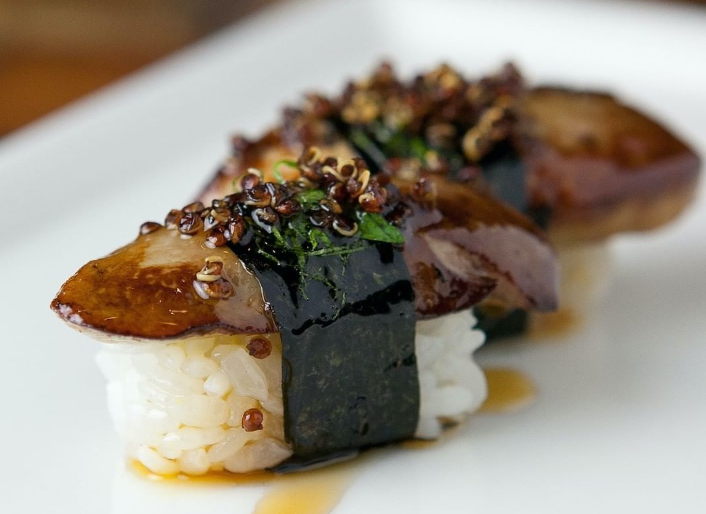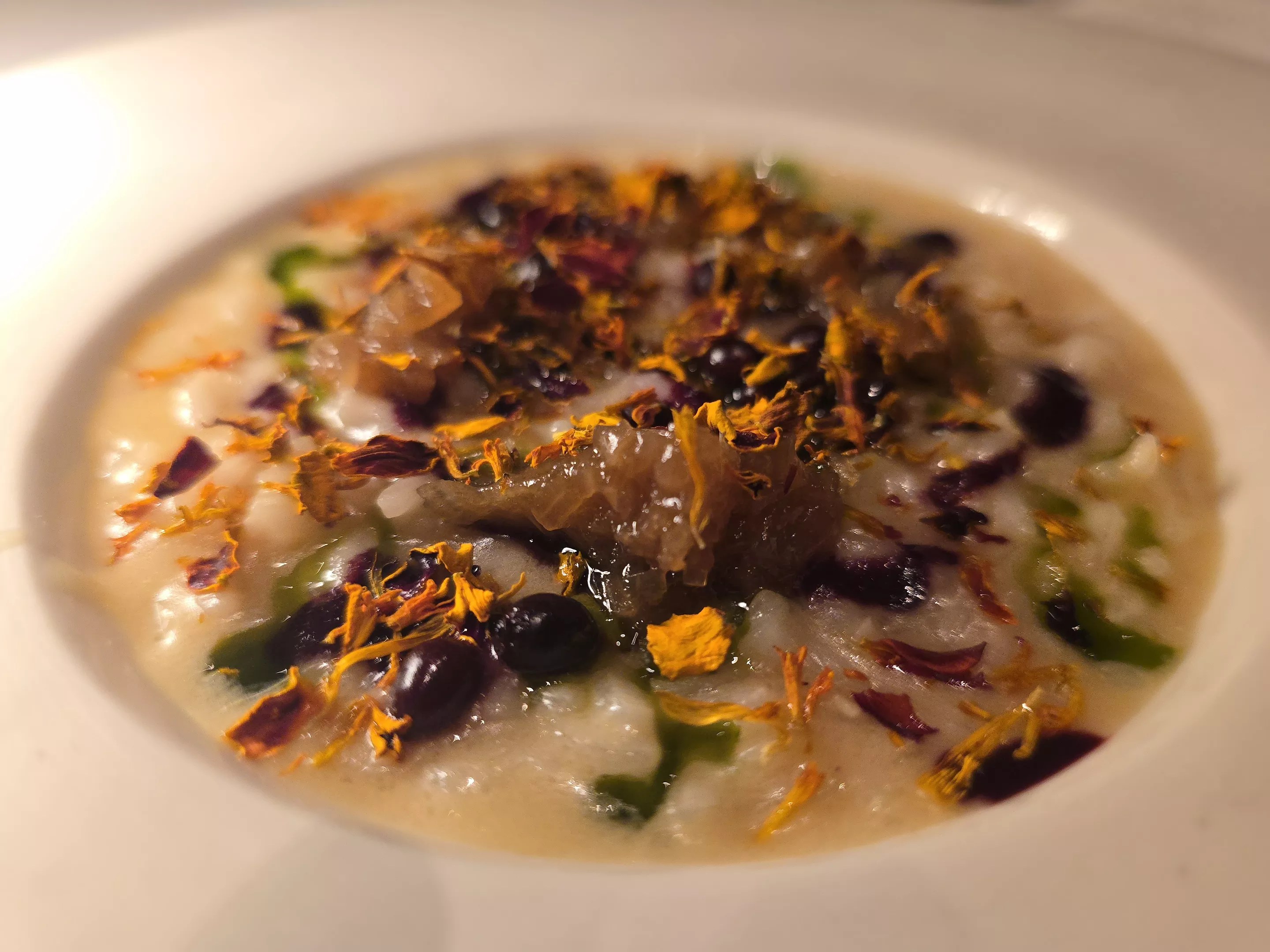
Uchi

Audio By Carbonatix
“Every single restaurant that sells foie gras in the greater Denver area can expect to soon have an open campaign against their sale of foie gras,” promises Thomas Gorman, director of the Duck Alliance. The group has put Denver restaurants on alert following multiple high-profile wins against Uchi, Palace Arms and Glo Noodle House. “We know exactly who you are, where you source it from, what dish you sell it in and how much you make from it – how prized of a menu item it is. And we’re ready for the long haul on every single one, whether it takes a week, a year, a decade or a lifetime.”
The protests targeting Uchi’s parent company, Hai Hospitality, began two years ago with groups of four to fourteen protesters who stood outside all of its locations, including Uchi Denver, with signs and bullhorns. “They were being a nuisance, but [we] weren’t worried about anything. They were just trying to get their point across,” says Tony Montero, CEO of Hai Hospitality. The protesters wanted Uchi to remove the foie gras nigiri with sweet eel sauce, which had been on the Denver location’s menu since it opened in 2018.
Six months ago, things took a turn. “They started coming into the restaurant and pulling out their horns and sirens, yelling stuff on bullhorns in the middle of the restaurant, making reservations, sitting down, and then a server comes up, then they pop up at the table using bullhorns and being very disruptive,” Montero explains. Soon, protesters were showing up at the personal residences of Montero, the restaurant’s general manager and the chef de cuisine.
“The First Amendment allows you to protest on public property, no matter whether it’s in a residential area, if it’s in a business area,” says Gorman. “We are disgusted by the vile foie gras industry and cruelty involved with it in production. … We’re not there to harass anybody, no one’s stalking anybody and following them around. We show up on public property, and yeah, sometimes in residential areas. And this is a last resort.”
Foie gras is the liver of a young duck or goose that has been force-fed two or three times daily for two to three weeks. The process is called “gavage”: Farmers insert a metal or plastic tube down the bird’s throat and pump in fish and/or grain. This artificially replicates the process known as lipogenesis, when ducks and geese consume more food to build up energy reserves, including in the liver, which can expand up to one and a half to two times its size. Using gavage causes the liver to enlarge six to ten times its normal size.
“[Activists will] say, ‘Imagine if somebody intubated you, they thrust a tube into your throat.’ … I mean, that’s horrible; we would fight not to be fed with a tube,” says Marcus Henley, director of farm operations at Hudson Valley Foie Gras, one of the two remaining foie gras producers in America and the supplier for Uchi and Glo Noodle House. “But the physiology of waterfowl is different.”
According to Jordan Ginor, an employee at Hudson Valley: “Unlike humans, the esophagus of a duck, it’s very similar to fingernails or the palms of our hands, with very little feeling. In fact, ducks at birth are fed by the mother, who will stick their beak all the way down the esophagus of the duck in a more invasive manner than our gavage process.”

Foie gras makes appearances locally in a variety of dishes, including this risotto from a recent meal at a fine-dining favorite.
Molly Martin
Henley likens the process to other agricultural and livestock practices – foreign and unnatural to outsiders, but when done properly, safe and unharmful to the animal. For example, waterfowl have a crop, which is a muscular pouch that acts as a temporary storage area before continuing to the stomach. At Hudson Valley, “you’ll see every farmer will inspect the individual crop of every single duck before feeding, and if there’s food left over, they’ll mark them as full” and skip that feeding, explains Ginor.
As for the claim that at the end of the gavage process, the ducks and geese are too heavy to move freely and are incapacitated, Ginor and Henley interrupt each other while responding with outrage, saying, “Absolutely ridiculous. I mean truly unbelievable. Patently false – I don’t want to have anything to do with that. The animals are healthy up until the time that we take them to harvest.”
Currently, gavage is the only reproducible farming practice that produces foie gras, and it is a specific method to enlarge the liver; ducks raised for meat or eggs are typically not subjected to it.
The resulting liver is typically turned into a p’té and is a staple of French cuisine and fine dining. It has an incredibly rich mouthfeel from the fattiness with a hint of sweetness, and is commonly served at the conclusion of the meal as a prelude to dessert. Foie gras falls squarely in the category of “luxury good”: Restaurants that carry it typically use it in a single dish for customers looking for “something a little bougie,” as one restaurateur put it.
Because of ethical concerns around production, California banned the production and sale of foie gras in 2012, as did Chicago last December. Chicago had previously enacted a band in 2006, but it was repealed in 2008 after significant opposition from local chefs and restaurateurs; New York City banned foie gras in 2019 but lifted the band in 2019 for similar reasons.Globally, India is the only country to ban the production and import of foie gras, while Australia, Argentina, Israel and several European countries including Austria, the Czech Republic, Denmark, Finland, Germany, Italy, Luxembourg, Norway, Poland, Turkey and the United Kingdom have banned the production of – but not the sale of – foie gras.
“Legislatively, it’s going to be phased out. It’s inevitable, even without our efforts,” Gorman says. But the Duck Alliance is committed to accelerating that inevitability, and it found a winning strategy with its approach at Hai Hospitality.
Starting in early September, the protesters started showing up at the houses of KSL staff – the investment firm behind Hai Hospitality – holding up signs with gruesome images of ducks constrained in captivity with their throats torn and ripped. In the middle of protests at the KSL offices, Gorman says, the group received notice via email that Hai Hospitality was pulling foie gras from its menu.
According to Montero, it was the responsible thing to do for staff and customers. “If you were ever in a restaurant when the protest was happening, it was definitely unnerving,” he says. “When you have a dozen people in front of your house yelling, ‘You’re a murderer’ and all kinds of nasty stuff – that you’re a murderer, you’ve got blood on your hands, you’re killing duck lives, Tony Montero’s gonna go to hell – it’s unnerving.”

Foie gras is a favorite ingredient for many fine-dining chefs.
Molly Martin
From eyewitness accounts and videos, the protests mostly stayed on the right side of legal. “There was never any violence; they knew what they were doing, because they would get in and out really quick,” Montero remembers. Even while protesting homes, the group stayed on the sidewalk. But tensions did run high, and tussles occurred. There are videos of protesters putting their bullhorns right next to customers’ faces as well as restaurant staff forcibly grabbing and lowering bullhorns and pushing protesters out the door. Police have been called multiple times to protests, and in one incident, a protester was arrested.
“We certainly remain 100 percent non-violent. We don’t attack people, we don’t put hands on anyone,” says Gorman. “We’ve taken punches to the face. A woman being pushed, and twelve-year-old boys being pushed in the middle of an Uchi restaurant in Denver. A woman had her face grabbed by a man while the staff of Uchi Denver sat there and laughed. But we put up with it because we’re not there to engage with these people when they’re violent. We’re there to ask them to be less violent.”
At the beginning, protesters were loosely affiliated grassroots activists from local groups. Buoyed by the Hai Hospitality success, they rebranded under the name the Duck Alliance and started organizing their efforts. They remain a 100 percent volunteer group with no formal legal structure.
In Denver, they targeted the Palace Arms at the Brown Palace, which removed foie gras from its menu within a week. Glo Noodle House was another target. On November 2, the Duck Alliance “walked in our doors and said we have until [next Wednesday] to take foie off or they’re going to stand out here with mega horns and cause a ruckus,” says Chris Teigland, chef and co-owner of Glo, which had a crispy sushi rice with seared foie, yuzu marmalade and shiso on its menu. After looking at videos of the other protests, Glo decided to pull the item off.

Glo’s crispy sushi rice with seared foie is no longer on the menu.
Glo Noodle House
“It’s just frustrating to be told something. If it was having a conversation, that’s one thing and saying, ‘Hey, you know what, I’ll side with you guys to pull it off,'” explains Teigland. “But just a, ‘You don’t have a choice.’ … Is this just the start of other things you’re going to be told you can’t do anymore and you don’t have a choice? I was just not okay with the way it was done.”
There’s no question that the Duck Alliance is a force to be reckoned with: It currently has a 100 percent success rate after convincing nearly 100 restaurants worldwide to drop foie gras. “It’s a simple ask, right? We’re not asking these people to shut down and completely change their menu. We’re not asking them to lose revenue. We’re asking them to remove one simple little menu item,” says Gorman.
Which restaurants are next on the group’s hit list, and what is the timeline? Gorman offers an ominous response: “Before the holidays. And let me put it like this: Michelin stars don’t want to be bothered with being protested, and people involved with Michelin stars don’t want to be bugged with being protested.”
He concludes with one last statement to Denver restaurants: “We’re doing it for the victims of these restaurants. We’re not doing it for a paycheck. We never clock out. We wait. We eat, sleep and breathe this movement. … You can continue to sell it, and if you do, there will soon be an open campaign against you.”